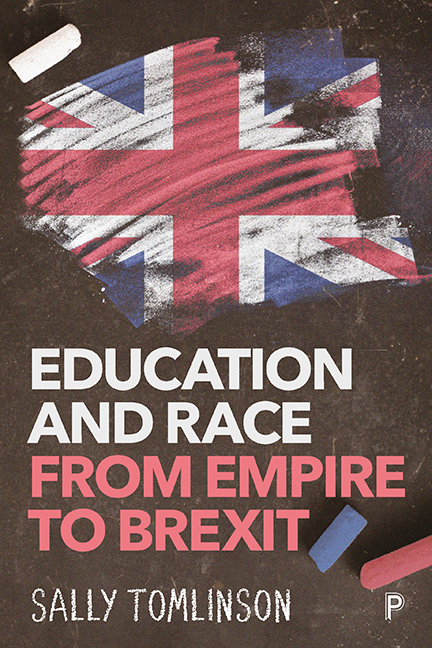Book contents
- Frontmatter
- Contents
- Acknowledgements
- List of abbreviations
- Introduction
- 1 Empire and ethnocentric education
- 2 Internal colonialism and its effects
- 3 Ending empire: Education for ignorance, 1945-1960s
- 4 Post-imperial anxieties and conflicts, 1970-90
- 5 Inequalities, a European Union and education markets, 1990-97
- 6 New Labour: Wars, race and education, 1997-2005
- 7 Not so New Labour: Race and education, 2005-10
- 8 A divided society: Race, class and education, 2010-16
- 9 A dog’s breakfast Brexit, 2016-18
- References
- Index
3 - Ending empire: Education for ignorance, 1945-1960s
Published online by Cambridge University Press: 27 April 2022
- Frontmatter
- Contents
- Acknowledgements
- List of abbreviations
- Introduction
- 1 Empire and ethnocentric education
- 2 Internal colonialism and its effects
- 3 Ending empire: Education for ignorance, 1945-1960s
- 4 Post-imperial anxieties and conflicts, 1970-90
- 5 Inequalities, a European Union and education markets, 1990-97
- 6 New Labour: Wars, race and education, 1997-2005
- 7 Not so New Labour: Race and education, 2005-10
- 8 A divided society: Race, class and education, 2010-16
- 9 A dog’s breakfast Brexit, 2016-18
- References
- Index
Summary
Despite a restructuring of education in post-war Britain there were initially few challenges to its underlying colonial-imperial value base which supported beliefs in the superiority of white people and white social institutions. (Tomlinson, 1990: 44)
In Andrea Levy's novel of a Jamaican man, Gilbert, arriving to join the war-time RAF in what he had assumed to be the ‘mother country’, an American officer from a segregated USA attempts to make sense of a black man mixing with white troops in England. The insulting language used then and later to Gilbert included ‘coloured’, ‘darkie’, ‘coon’, ‘nigger’, ‘blackie’, ‘wog’. When Gilbert tells his white friend's husband, ‘You know what your trouble is, man? Your white skin. You think it makes you better than me. You want to know what your white skin makes you? It makes you white. That's all. No better, no worse than me’ (Levy, 2004: 525), this message is incomprehensible to the man, whose education and war-time service as a lower rank soldier in India had convinced him of the superiority of white over all ‘coloureds’ and foreigners. In the real world, an English officer serving in India who passionately supported the British Empire, Enoch Powell, later an MP, had already written a paper in 1946 opposing any Indian migration to Britain. But the British Nationality Act in 1948 gave all imperial subjects the right of free entry into Britain, although distinguishing between citizens of independent, mainly white, Commonwealth countries and those in the colonies and dependent territories. The Act was possibly, as Robert Winder has suggested, to demonstrate that the British Empire was still a vibrant entity (Winder, 2004: 332).
The fictional Gilbert had arrived back in England in 1948, on a captured Nazi troopship that had been refitted and called the Empire Windrush. Some 490 men and women came from the Caribbean on this ship, skilled workers of whom over half already had jobs to go to in England. A British government that had overseen the post-war immigration of 200,000 Polish and other European displaced people was so alarmed at the potential arrival of a few hundred ‘coloured’ workers, that the Foreign Office was instructed that ‘no effort be made to help these people, otherwise it might encourage a further influx’, and they were initially housed in an old air-raid shelter in Clapham in South London.
- Type
- Chapter
- Information
- Education and Race from Empire to Brexit , pp. 63 - 88Publisher: Bristol University PressPrint publication year: 2019



